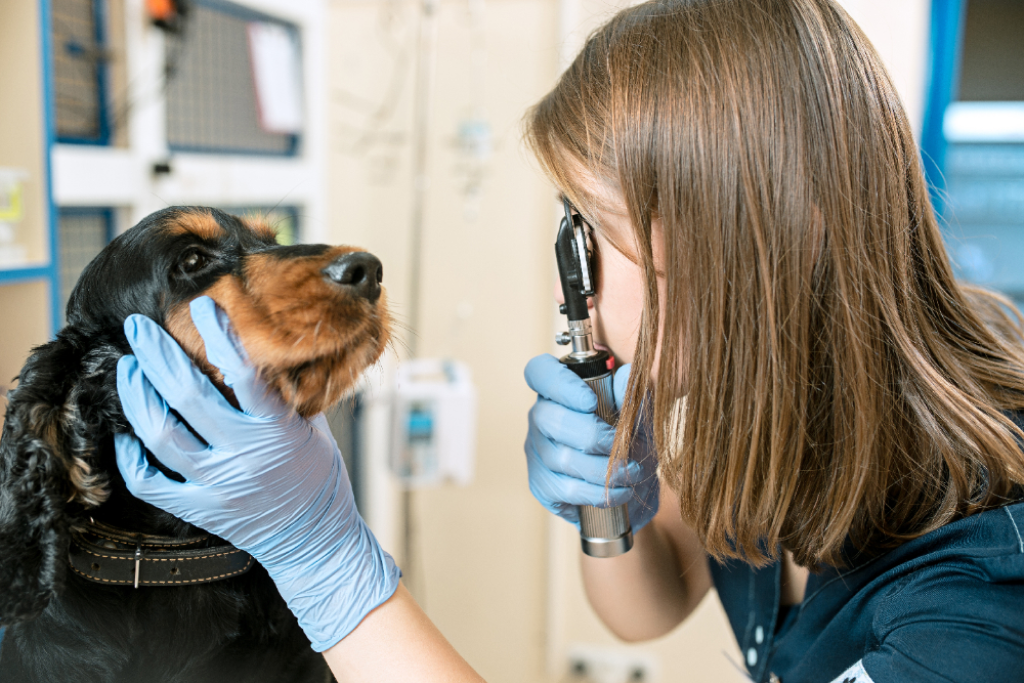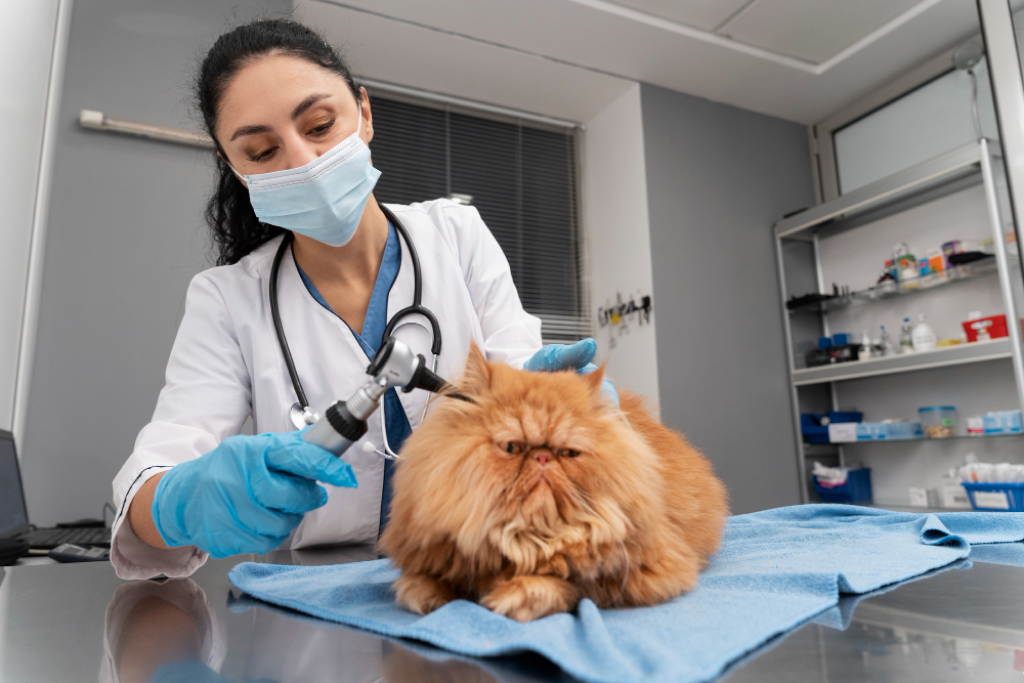From allergies to underlying health complications
Seeing or hearing your dog itching constantly is never nice for pet owners. It’s hard to know straight away what’s causing the itching, how severe it is and whether they have any other symptoms. Persistent itchiness in dogs is something we see regularly here at Knutsford Vets and it can be caused by any number of underlying conditions affecting both their skin and their general health. In this article we discuss what could be causing your dog to itch. If you have direct concerns do not hesitate to book an appointment online or call us to make a booking.
So, what could be causing your dog to itch?
There are a range of conditions that can cause your dog to itch. These can either be conditions or injuries localised to the area of the itching or they could be caused by a problem with their overall health. It’s also common for dogs to scratch when they are in pain or as a response to boredom or anxiety. Some potential causes could include: –
- External Parasites
- Allergies
- Skin Diseases
- Infections
- Injuries or Pain
Now let’s take a look at each of these potential causes.
Parasites
Parasites, including fleas, mites and ticks are probably the most common cause of itching in dogs. Ticks can usually be spotted on the surface of the skin by inspecting beneath the coat and fur. Fleas are harder to spot and will largely go unnoticed until there is a large infestation. Mites are microscopic and require a vet to investigate skin and coat samples under a microscope. All of these require treatment of some kind, but luckily they are easily treatable.
Skin infection
Skin infections, including both fungal and bacterial infections are a common cause of itchiness in dogs. There are a number of different skin infections, these can either be caused by injury, poor coat maintenance or fleas. They may also occur naturally without any noticeable external factors contributing.
Allergies
Allergies are another common cause of itching in pets. This can include food allergies, environmental allergies (such as allergies to mould or pollen) or a reaction to soap or shampoo, also known as contact dermatitis. This will often present as general itchiness and your dog may scratch all over their body. Common allergies include:
- Atopy – Atopy is caused by environmental allergens that are inhaled or come into contact with the skin; commonly pollens, dust mites and mould.
- Flea Allergy Dermatitis – Caused by flea bites and in dogs and cats severely affected, just one flea bite can precipitate a nasty reaction
- Food Allergies – Pets may have a range of food allergies, but symptoms usually manifest themselves in the form of skin irritation in contrast to food intolerances that result in vomiting and diarrhoea.
- Contact Allergies – Contact allergies are caused by something pets come into direct contact with such as carpet fibres or plastics from food bowls for example. These are often noted around the thinly haired areas of the muzzle or belly.
Injury or Pain
If your dog is injured, cut or in some kind of pain that is localised to a specific area, itching or pawing at the area is a common response. Whenever dogs feel uncomfortable they will often paw, scratch or bite the area which can be confused for itchiness. Inspect the surface of the skin any noticeable signs of injury, such as cuts or debris stuck in the skin. You should then rub the area affected to see if they show signs of discomfort that could be caused by injury or pain to bones, muscles or internal organs.
How can I find the cause of my dog’s itching?
When it comes to finding out what’s causing your dog’s itching, the best place to start is always your local vets. Obviously the level and severity of any itching will determine the length of time to wait before visiting.
If the itching is severe, constant and persistent and begins suddenly wait no longer than a couple of days. For itching that is less persistent, but continues over a few days it’s probably worth waiting a week. If in any doubt always contact your local vet and discuss the symptoms, a consultation will only cost a small amount, but it could put to an end any discomfort or identify a serious illness.
Initial Examination
If you visit your local vets they will begin by observing the skin itself, before asking a range of questions about the behaviour of your pet in the days when the skin issue occurred. This will help them determine if it’s an issue with the skin itself or whether the itchiness is a symptom of a more general health issue.
Diagnosis
Diagnosis of allergies can be complex and requires the ruling out of skin conditions caused by parasites e.g. sarcoptic mange (fox mange) or demodex. Yeasts and bacteria may exacerbate symptoms. The distribution of your pet’s skin complaint, along with the time of year they are affected and response to trial medication can give your vet a lot of information.
However, should they be severely or recurrently affected it is often worth investing in allergy testing. This can be done either with intradermal skin testing or with blood testing. The latter is less invasive and is increasingly accurate with tests more widely available.
Identification of specific allergens allows these to be avoided where possible and in the case of food allergies can make a huge difference in the dog’s wellbeing by a simple change to a diet their immune system will not react to. Such diets range from novel protein and carbohydrate sources in a purer form than some commercial diets, through to veterinary prescription diets that are specifically designed to prevent the body from recognising proteins and reacting to them.
For environmental allergens e.g. house dust mites and pollens, treatment can be tailored to suit the individual, including the use of shampoos, skin supplements, antihistamines, avoidance of allergens and environmental sprays. A further advancement is an immunovaccine, which work to try to desensitise the body to the specified allergens over a long period of time.
These can be very effective in dogs, to the exclusion of all other treatments.
In many cases, however, treatment is multi-modal and may change depending on flare factors present at any given time. It is important to remember that these are often some of the most frustrating cases both for owners and vets, as they can be difficult to manage and quite debilitating for our furry friends.
Call 01565 337999 or contact us here at Knutsford Vets if you think your pet may be suffering from an allergy.
Diagnostic Testing
The way in which we diagnose the cause of your pet’s itching will vary depending on what we believe to be a potential cause. Some of the tests that your vet can do include: –
- Swabs – these can be taken from skin and from the ear canal for examination for the presence of bacterial infections in a laboratory setting.
- Microscope analysis – a vet can take hair plucks and skin scrapes to investigate for the presence of fungal infections.
- Hair pluck analysis – hair plucks can help identify the presence of fungal infections in a laboratory.
- Skin biopsies – a section of skin can be taken from the pet for further analysis. This can help identify allergies and immune conditions affecting the skin.
- Allergy testing – if all other issues have been ruled out and the vet believes the itchiness is caused by a food allergy, you may be required to keep a food diary or restrict items of food to eliminate potential causes.
To discover more about what could be causing your dog to itch, visit our pet dermatology hub.
To make an appointment at Knutsford Vets Surgery visit our dermatology referrals page.







